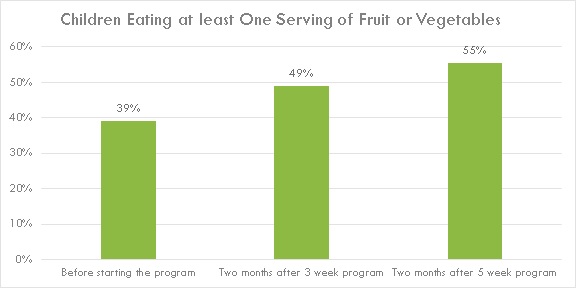
Token Choices: Increasing Healthy Eating
Organization : Center for Health Incentives and Behavioral Economics
Project Overview
Project Summary
Elementary school students received special tokens each time they ate a serving of fruits or vegetables during the school day.
Impact
Offering special tokens as rewards increased the number of children eating fruits and vegetables by 10 percentage points in a three-week program, and by 16.4 percentage points in a five-week program (from a baseline of 39%).
Cost
During the incentive period, the program cost $0.50 per each additional child eating a serving of fruits or vegetables. However, once the incentives were removed, the cost per additional child decreased to about $0.28 (measured two months after the end of the intervention).
Challenge
Consuming the recommended daily servings of fruits and vegetables helps ward off cardiovascular diseases, stomach cancer and colorectal cancer, but can be difficult, especially for younger children. Many school-based interventions now focus on helping kids makes healthier lunchtime choices.
Design
Students in Utah elementary schools received tokens worth $0.25 every time they ate a serving of fruits or vegetables during lunch. The tokens had a picture of an apple and a carrot, and could be redeemed at the school store, school carnival, or book fair. Schools distributed tokens for a period of either three or five weeks.
Before distributing the tokens, the researchers introduced the program through a morning announcement at the schools, and in a newsletter to parents. When passing out the tokens during lunch, the research assistants explained to each student why he/she was receiving one, and reminded those who did not take a serving of fruits and vegetables that they could get one if they complied. To mitigate the risk of children hiding instead of eating their fruits and vegetables after receiving a token, schools stressed the importance of honesty and warned that they would stop the program if they detected cheating.
Impact

This pre/post evaluation found that both the three-week and five-week token programs improved students’ lunchtime eating habits. Over the course of the three-week program, the number of children eating one serving of fruits and vegetables on a given day nearly doubled, increasing by 36.5 percentage points from 39.9% to 76.4%. More importantly, healthy eating habits persisted two months after the children stopped receiving tokens, with about 50% of students still eating at least one serving of fruit and vegetables each day.
In the five-week program, the tokens had an even greater impact, with 79.5% of children eating one serving of fruits or vegetables each day, compared to a baseline of 37.6%. Two months after the token program ended, 54% of students continued to eat at least one serving with their lunch.
Implementation Guidelines
Inspired to implement this design in your own work? Here are some things to think about before you get started:
- Are the behavioral drivers to the problem you are trying to solve similar to the ones described in the challenge section of this project?
- Is it feasible to adapt the design to address your problem?
- Could there be structural barriers at play that might keep the design from having the desired effect?
- Finally, we encourage you to make sure you monitor, test and take steps to iterate on designs often when either adapting them to a new context or scaling up to make sure they’re effective.
Additionally, consider the following insights from the design’s researcher:
- Longer incentive periods may strengthen habits and lead to greater sustained results, but incentives can achieve long-term effect even if they are small and offered over a relatively short time frame.
- Incentives should always be distributed consistently and shortly after the child completes the desired action.
- Incentives can work even if they are non-transferable (e.g. tokens that can only be used at the school store or other school services) and redeemable after a delay.
Project Credits
Researchers:
George Loewenstein Carnegie Mellon University
Joseph Price Contact Brigham Young University
Kevin Volpp Leonard Davis Institute; Penn Medicine Center for Innovation; Perelman School of Medicine and the Wharton School, University of Pennsylvania


